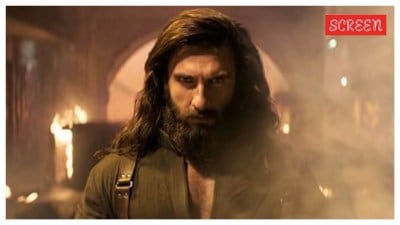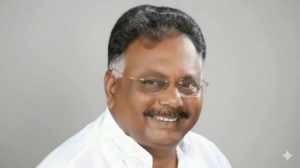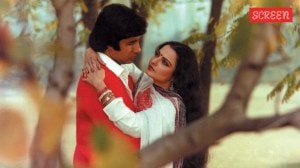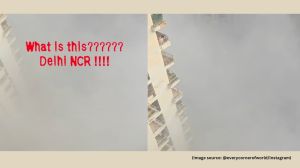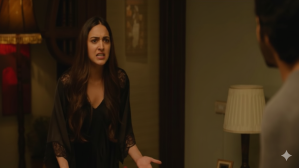
***********
Rajiv Gandhi was sworn in as the Prime Minister of India on October 31, 1984, after the assassination of his mother and then PM Indira Gandhi, becoming the country’s youngest PM at the age of 40.
Rajiv served as the seventh PM and remained in office till December 2, 1989 — for a period spanning 1,858 days.
Born on August 20, 1944, in Bombay (now Mumbai), Rajiv was an alumnus of Doon School, Dehradun. A professional commercial pilot, he reluctantly took a plunge in politics and became a Congress party leader.
Rajiv’s parliamentary journey began on August 17, 1981, when he became a member of the seventh Lok Sabha after winning a by-election to Uttar Pradesh’s Amethi constituency, which became vacant due to the death of his younger brother Sanjay Gandhi in an air mishap, who had won the seat in the 1980 general elections.
 Prime Minister Rajiv Gandhi. (Express Archive)
Prime Minister Rajiv Gandhi. (Express Archive)
As an MP, Rajiv actively participated in the proceedings of the Lok Sabha from August 1981 to October 1984.
Story continues below this ad
On August 23, 1984, when the House was discussing the Constitution (50th Amendment) Bill, 1984, CPM member Satyasadhan Chakraborty attacked the Congress government, saying “The framers of the Constitution promised to the people that Article 356 would be a dead letter…The Congress party have used this particular provision more than 60, 70 times and also only for their political purpose, not for the national purpose”.
Responding to his remarks, Rajiv said, “I would just like to comment on what Prof. Chakraborty has said…But I would like to remind him that the political ends of the Congress were freedom of this country and the political ends of the Congress are democracy in this country…I would further like to ask him as to what are his political ends?”
Soon after taking over as the PM following Indira’s assassination, Rajiv opted for fresh parliamentary polls.
 Prime Minister Rajiv Gandhi presenting a packet of biscuits to a child at a hospital in Kamorta Island which he visited on December 29, 1986. (Express Archive)
Prime Minister Rajiv Gandhi presenting a packet of biscuits to a child at a hospital in Kamorta Island which he visited on December 29, 1986. (Express Archive)
The elections to the eighth Lok Sabha were held in November-December 1984 in which 7 national parties — the Indian National Congress (INC), Bharatiya Janata Party (BJP), Communist Party of India (CPI), Communist Party of India-Marxist (CPM), Indian Congress-Socialist, Janata Party (JNP) and Lok Dal (LKD) — 17 state parties and 9 registered (unrecognised) parties were in th fray.
Story continues below this ad
The Congress swept the polls by winning 404 out of 514 seats for which elections were held. This is the highest number of seats won by any party in the country in the Lok Sabha elections till date.
Of the six other national parties, only two – the CPM (22 seats) and JNP (10 seats) could reach a double-digit figure, with the tallies of the remaining four showing: the BJP (2 seats), LKD (3), Indian Congress-Socialist (4) and CPI (6).
In the elections, the BJP and other Opposition parties thus could not pose any challenge to the Congress, which rode a tidal wave of sympathy generated by Indira’s assassination. Rajiv himself won from Amethi by defeating Independent candidate Maneka Gandhi, wife of late Sanjay Gandhi, with a margin of 3,14,878 votes.
 A group of Brahmkumaris called on the Prime Minister Rajiv Gandhi to greet him on the occasion of Raksha Bandhan in New Delhi on August 17, 1989. (Express Archive)
A group of Brahmkumaris called on the Prime Minister Rajiv Gandhi to greet him on the occasion of Raksha Bandhan in New Delhi on August 17, 1989. (Express Archive)
The general elections to the 9th Lok Sabha were held in November 1989 in which 8 national parties – the incumbent INC, BJP, CPI, CPM, Indian Congress-Socialist, Janata Dal and LKD (Bahuguna) — participated. The elections this time however threw up a fractured mandate with no party winning a clear majority. The Rajiv-led Congress emerged as the single largest party by winning 197 of 510 seats it contested. The Janata Dal stood second by winning 143 seats, while the BJP (85 seats) came third. The CPI got 12 seats and Indian Congress -Socialist 1, while the JNP and LKD (B) could not open their accounts.
Story continues below this ad
Rajiv won the election comfortably from his Amethi seat, defeating the Janata Dal’s Raj Mohan Gandhi, grandson of Mahatma Gandhi.
After the polls, Janata Dal leader VP Singh became the PM and remained in office for less than a year. He was replaced by Chandra Shekhar, who could not complete his tenure either.
On March 13, 1991, the 9th Lok Sabha was dissolved and the mid-term polls were held in which the Congress’s tally rose to 232 seats, stopping short of a majority.
Rajiv had contested from Amethi and again won by a huge margin. But, he was assassinated on May 21, 1991, days before the declaration of the election results.
Story continues below this ad
 India’s longest-serving prime ministers
India’s longest-serving prime ministers

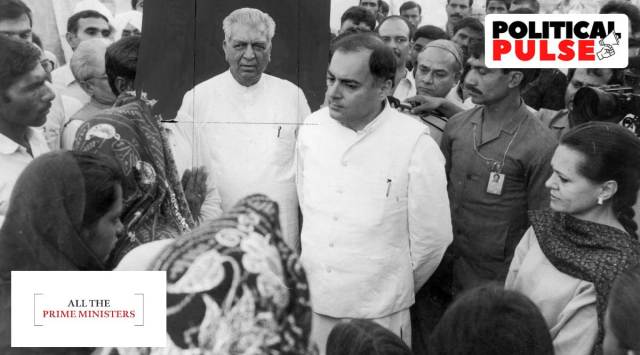

 Prime Minister Rajiv Gandhi. (Express Archive)
Prime Minister Rajiv Gandhi. (Express Archive) Prime Minister Rajiv Gandhi presenting a packet of biscuits to a child at a hospital in Kamorta Island which he visited on December 29, 1986. (Express Archive)
Prime Minister Rajiv Gandhi presenting a packet of biscuits to a child at a hospital in Kamorta Island which he visited on December 29, 1986. (Express Archive) A group of Brahmkumaris called on the Prime Minister Rajiv Gandhi to greet him on the occasion of Raksha Bandhan in New
A group of Brahmkumaris called on the Prime Minister Rajiv Gandhi to greet him on the occasion of Raksha Bandhan in New  India’s longest-serving prime ministers
India’s longest-serving prime ministers
